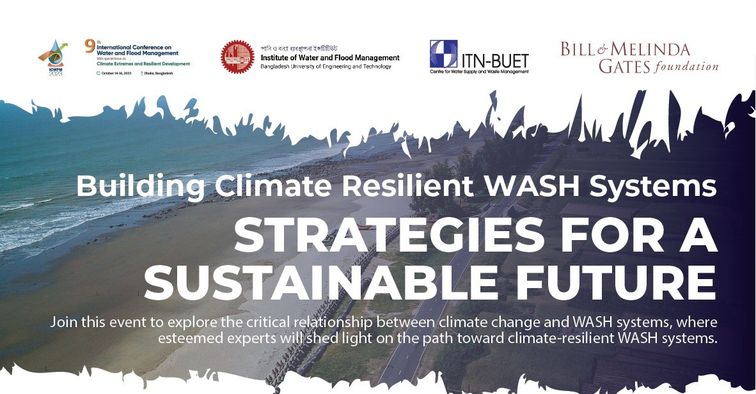
- This event has passed.

The International Conference on Water and Flood Management (ICWFM) 2023
October 16, 2023 @ 12:00 pm - 1:30 pm UTC+6
Title: Building Climate Resilient WASH Systems: Strategies for a Sustainable Future
Conference Theme: Water Infrastructure and Resilient Development
Background:
As a low-lying, deltaic country, Bangladesh is highly affected by the current and projected impacts of climate change. Climate change is exacerbating both slow (sea-level rise, temperature rise), medium (drought occurrence, changing rainfall patterns), and fast onset (storms including cyclones, storm surges, riverine-, coastal, and flash floods) hazards and their knock-on effects (e.g., erosion, landslides).
Bangladesh has made commendable progress in the Water, Sanitation, and Hygiene (WASH) sector, recognizing its significance for sustainable development and public health. However, the country faces significant challenges due to the adverse effects of climate change towards the Sustainable Development Goal (SDG) 6 – ensure availability and sustainable management of water and sanitation for all by 2030.
The linkage between Water, Sanitation, and Hygiene (WASH) and climate change is undeniable. Climate change impacts the availability, quality, and distribution of water resources, which in turn directly affects WASH services and practices. Rising temperatures, changing rainfall patterns, and increased frequency of extreme weather events such as droughts and floods all contribute to water scarcity, reduced water quality, and compromised sanitation systems. The country’s geographical location next to the Bay of Bengal, low-lying terrain, monsoons, and significant rivers render the country more vulnerable to natural hazards. From 1970-2019, storms were the most frequent disaster to affect Bangladesh at 52%, followed by floods at 31%, with the remaining disasters being epidemics, earthquakes, droughts, and landslides. Additionally, climate change exacerbates existing challenges faced by vulnerable communities, including limited access to safe drinking water, sanitation facilities, and proper hygiene practices. This affects marginalized and vulnerable groups disproportionately, like communities in saline-prone coastal areas, in drought-prone areas, or in the hill tracks.
Climate resilient development involves measures and activities that will deliver benefits under all potential future climate scenarios and can cope with uncertainties over future conditions. Water is the means through which climate change is felt first. Resilient WASH programming is crucial to ensure that WASH infrastructure and services are sustainable and resilient to climate-related risks, safeguard public health, and promote environmental sustainability. As communities are increasingly affected, it is clear that climate change risk assessment and building the resilience of communities, water and sanitation systems, and institutions must be at the core of sectoral programme design, planning resource allocation, implementation, and monitoring.
Objectives and rationale of the side event:
This event aims to explore the critical intersection of climate change and water, sanitation, and hygiene (WASH) systems. As the effects of climate change intensify, it is imperative to develop and implement climate-resilient WASH strategies to ensure the availability, accessibility, and quality of water, sanitation, and hygiene services for all. This session will bring together experts, practitioners, policymakers, and researchers to discuss innovative approaches, best practices, and transformative solutions in building climate-resilient WASH systems. By sharing knowledge, experiences, and lessons learned, this session will contribute to collective efforts to address the challenges posed by climate change and advance sustainable development goals.
Date: Monday, 16th October 2023
Time: 12:00 to 1:30 PM (1.5 hrs)
Venue: CIRDAP Auditorium
Session Format:
Keynote Address (15 minutes): An eminent expert will provide an overview of the challenges and opportunities in building climate-resilient WASH systems, setting the stage for the session.
Keynote Speaker: Saifur Rahman, Superintending Engineer, Ground water circle, DPHE
Panel Discussion (40 minutes): A diverse panel of experts representing academia, governmental and non-governmental organizations, development partners, I/NGOs, Private sector will share their experiences, insights, and lessons learned in implementing climate-resilient WASH strategies. The panel will address topics such as infrastructure design, relevant policies, guidelines and standards, innovation, climate-resilient technologies etc.
Panelist:
- Tushar Mohon Shadhu Khan, Additional Chief Engineer, DPHE
- Md Liakath Ali, Director of the Climate Change, Urban Development, Disaster Risk Management Programme, BRAC
- Nargis Akter, WASH Officer, Unicef Bangladesh
- Alauddin Ahmed, Project Manager, ITN-BUET
Open Forum (25 minutes): An open forum will provide participants with an opportunity to ask questions, share their experiences, and engage in broader discussions on the key themes and issues raised throughout the session.
Wrap-up and Conclusion (10 minutes): The session will conclude with a summary of the main findings, key takeaways, and recommendations for further action by the moderator.
Session Outcome:
- Enhanced knowledge and understanding of best practices, innovative technologies, and community engagement strategies in building climate-resilient WASH systems.
- Increased awareness of the impacts of climate change on WASH systems and the urgency to prioritize climate resilience in planning and implementation.
- Identifying major gaps and challenges in climate-resilient WASH program design, implementation, and monitoring
- Identification of key strategies and research priorities to strengthen climate resilience in WASH systems.
- Enhanced collaboration and networking among stakeholders from diverse sectors, fostering partnerships for future initiatives.
- Development of a session report summarizing the key findings, recommendations, and action points to be shared with conference participants and relevant stakeholders.
Potential Participants:
The event will be open to all, with potential participants from WASH sector stakeholders, including academia, research organization, governmental and non-governmental organizations, development partners, I/NGOs, private sectors, and the media.

